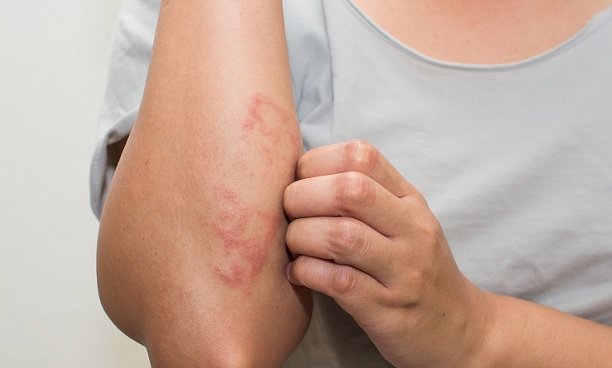Environmental allergens can trigger an eczema flare, whether it’s the smoke from wildfires or the heavy fragrance of a store-bought detergent. In addition, using harsh cleansers or fabrics can also compromise your skin barrier.
Keeping a diary of your symptoms can help pinpoint your triggers. Use a HEPA filter in your home and avoid long hot showers; bathe in lukewarm water. Dry your skin gently, and apply a moisturizer while still damp.
Food Allergies
Those itchy, red eczema patches may not just be annoying—they could reveal something about your health. Those rashy areas may reveal a food allergy, infection, or chemical irritating your skin.
Your immune system helps protect you from things like bacteria and viruses that can make you sick, but with eczema, your immune system can overreact to small irritants or allergens, making the skin itch and flake. The immune system misinterprets your skin cells as foreign invaders and attacks them.
Food allergies can trigger a flare or make one appear, and they’re more common in children but can also affect adults. Your doctor can do a skin prick test to see what you’re allergic to, and then you can try eliminating foods that make it worse.
Eczema causes and triggers include scented laundry detergents, body soaps, perfumes, and other personal care products. It can also make eczema worse in some people. You can avoid these by choosing hypoallergenic, fragrance-free options. In addition, using non-fragranced moisturizers like ointments or creams every time after showering and bathing can help.
Allergens
An allergic reaction is when the immune system sees something that shouldn’t be there as a threat and reacts to it by sending inflammatory chemicals to the site of the allergen, which triggers symptoms like itching, redness, swelling and flakiness. Skin allergies, like atopic dermatitis or eczema, can result when you come in contact with things that irritate the skin, including certain foods, protein-rich substances such as dairy, eggs, fish, wheat, nuts and soy, some natural liquids, metals like nickel and cobalt, and some perfumes.
Food intolerances and allergies play a huge part in the itching caused by eczema, but they’re not the only cause. Other common eczema triggers include hay fever (rhinitis), some medications, cold or damp weather, and rubbing or roughly stroking your skin. Identifying your triggers and working with your board-certified dermatologist to prevent them will help reduce those pesky flares.
Irritants
If you have eczema, what makes it worse are called irritants. They include allergens like pollen, pet dander or dust mites, harsh soaps and detergents, perfumes, chemicals and solvents, rough fabrics, cold weather (low humidity), infections and stress. For many people, certain viruses — such as herpes simplex or molluscum contagiosum – also trigger itching and rash.
You may not even know you are using an irritant when bathing or scented body wash, hand and dish soaps, fabric softeners, or surface cleaners. Many common chemicals are known to be irritants for those with eczema, including ammonium laureth sulfate, sodium lauryl sulfate, benzoyl peroxide, fragrance, methylisothiazolinone, phenylmethane, phthalates, thioglycolate, urea, colophony (tree resin), Myroxylon balsamum (balsam of Peru), and synthetic ingredients found in wool, nylon, acrylic and terry cloth. It is recommended to always wash new clothing before wearing it and use natural fabrics such as cotton or cotton blends. Be sure to remove tags and seams from clothing, and consider a hypoallergenic emollient as part of your daily skincare routine.
Chemicals
Various chemicals—even the natural ones that makeup steam and liquid water—can irritate the skin, causing it to burn or sting. This is true of everyday household products such as soaps and detergents, cosmetics and perfumes, metals like nickel (which triggers a form of eczema called contact dermatitis), and even certain fabrics.
Viral illnesses that affect the skin, such as herpes simplex and molluscum contagiosum, can also cause pre-existing eczema patches to flare up. And some people’s genes may make them more susceptible to a weakened skin barrier, Dr. Fishbein notes.
And a sudden surge in hormones—like those associated with menstruation and pregnancy or during the perimenopausal stage—can be an eczema trigger, too. In some cases, this type of eczema trigger can lead to more serious problems, such as cellulitis, caused by an infection from bacteria that inflames the tissues and surrounding skin. In these instances, a person should see a healthcare professional for treatment.
Viral Illness
Bacteria are single cells that can live independently, inside or outside your body, and most bacteria aren’t harmful. But some can cause infections. These are called pathogenic bacteria. They can enter your body through droplets or particles that someone with the disorder breathes into you or by touching contaminated surfaces and then putting your hand in your mouth, nose, eyes or skin.
Viruses are even smaller than bacteria and cannot survive independently — they need a host cell to grow and multiply. They can’t be killed with antibiotics, and they spread from person to person through air or by touching contaminated objects or surfaces.
Most viral illnesses — like the common cold or stomach flu — aren’t serious and clear up independently, especially with home treatment. But some, such as herpes simplex viruses, hepatitis B and C, HIV, or influenza, can be very serious and last for weeks, months, or years. Antiviral medications can help manage the symptoms. They can relieve pain, reduce fever, and help you feel better over a few weeks.
- Also, Read: Exploring the Benefits of Hair Follicle Cloning
